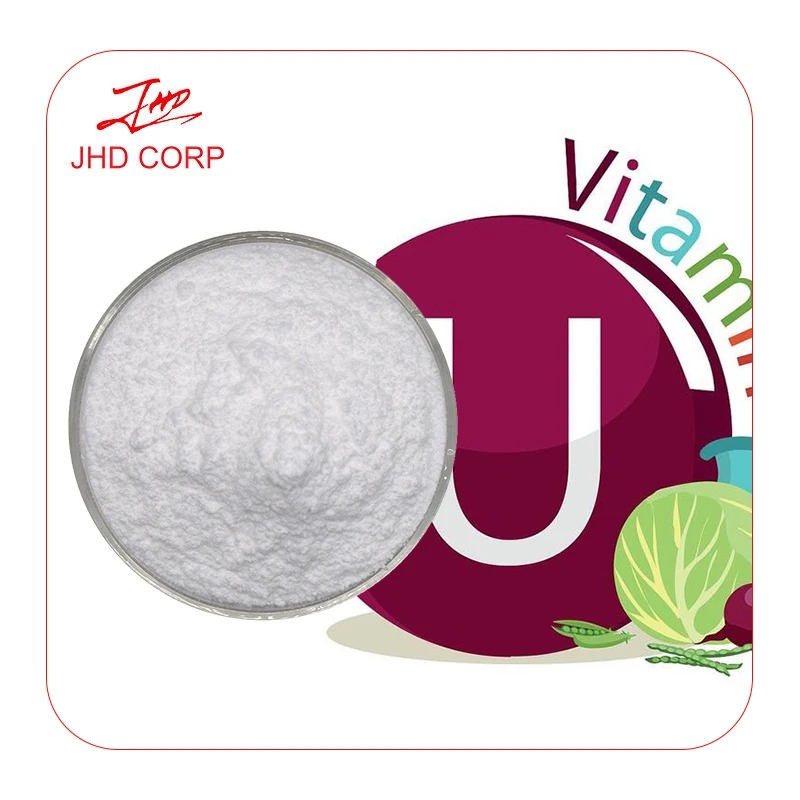Welcome to JHD Nutrasource!
Shop
Vitamin U
Vitamin U, despite its name, is not a true vitamin but a sulfur-containing organosulfur compound identified in cabbage juice by Garnett Cheney in 1950. The most common form, S-methylmethionine sulfonium chloride (SMMS), is a white crystalline powder with a molecular formula of C6H14ClNO2S and a molecular weight of 191.67 g/mol. Highly soluble in water (50 g/100 mL at 25°C), it features a sulfonium group, making it a source of labile methyl groups for biochemical reactions. Stable under normal conditions, it is heat-resistant up to 120°C, suitable for food processing.
| Product Name | Vitamin U |
| Appearance | White Powder |
| Specification | 98% |
| Test Method | HPLC |
| CAS No | 3493-12-7 |
| MF | C6H14ClNO2S |
| Certificate | ISO/cGMP/KOSHER/HALAL/USDA ORGANIC |
Description
Functions
Gastroprotective Actions:Stimulates the secretion of mucus and bicarbonate in the gastric mucosa, forming a protective barrier against hydrochloric acid and pepsin. It enhances mucosal blood flow, promoting angiogenesis and cell proliferation in the stomach lining, which aids in healing peptic ulcers by accelerating epithelial regeneration. Mechanisms may involve upregulating heat shock proteins (HSP70) and inhibiting Helicobacter pylori adhesion to gastric cells.
Methyl Donor and Antioxidant:Donates a methyl group to homocysteine, converting it to methionine in a reaction requiring folate and vitamin B12, thus contributing to homocysteine metabolism and reducing cardiovascular risk. The sulfonium moiety also scavenges hydroxyl radicals and peroxynitrite, protecting gastric cells from oxidative damage associated with ulceration.
Liver Detoxification Support:Participates in phase II detoxification by providing methyl groups for methylation reactions, enhancing the conjugation of xenobiotics (e.g., drugs, pollutants) with sulfur-containing compounds, making them more water-soluble for renal excretion.
Applications
Gastrointestinal Health Products:
Supplement Formulations: Capsules and tablets (200-500 mg/day) for gastritis, acid reflux, and ulcer prevention, often combined with probiotics, glutamine, or deglycyrrhizinated licorice (DGL) for synergistic effects.
Functional Foods: Added to fermented drinks, herbal teas, and dietary bars targeting digestive health, with common sources including raw cabbage, broccoli, and Brussels sprouts (10-50 mg/100g).
Veterinary Medicine:
Livestock Gut Health: Used in piglets and calves to reduce post-weaning diarrhea by strengthening intestinal mucosa, typically at 50-100 mg/kg feed.
Pet Supplements: Included in dog/cat formulas for vomiting, gastritis, or post-surgical gastrointestinal support.
Research and Pharmaceutical Development:
Anti-Ulcer Drug Candidate: Investigated for its potential to replace proton pump inhibitors (PPIs) by addressing mucosal protection rather than acid suppression, with preclinical studies showing reduced ulcer severity in animal models.
Cosmetic Ingredients:In niche skincare, SMMS is explored for its anti-inflammatory properties, though human studies are limited.

